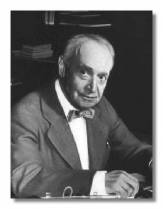
The legendary music director of the Boston Symphony from 1924-1949 Serge Alexandrovich Koussevitzky was born to a poor, but musical family in Vishny-Volochok, Russia on July 26, 1874. At the age of 14 he ran away from home and began his musical studies at the School of the Moscow Philharmonic Society. He chose the double bass because it was one of the few instruments for which a full scholarship was available. Within a few short years, he became known throughout the world as the supreme virtuoso on his instrument. His remarkable recordings as a bassist may be heard on a fascinating Biddulph CD (WHL 019).
In 1905, Koussevitzky married Natalya Ushkov, the daughter of a rich tea merchant. Thanks to his wife's fortune, he was able to quit his job as principal bass of the Bolshoi Theater Orchestra and move to Berlin where he pursued his dream of becoming a symphony conductor. His method was unique. He studied the greatest practitioners of the time (especially Artur Nikisch) and then taught himself to conduct an orchestra. Using a bit more of his wife's wealth, he hired the Berlin Philharmonic in 1908 and made his conducting debut. The critics were ecstatic. One wrote: "Koussevitzky left no doubt that he is an interpreter of uncommon temperament … If this was actually Koussevitzky's first essay in conducting it must certainly be said that much is to be expected from him." That prophecy was soon realized.
The following year Koussevitzky returned to Russia and founded his own orchestra. At about this same time, he established the 'Editions Russe de Musique' to publish the latest works of Russia's most promising young composers. His passion for new music was to continue until the end of his days. In order to bring great music to the largest segment of the Russian public, he engaged a steam ship to take his orchestra up and down the Volga river for a series of annual concerts. Only the advent of WWI prevented these memorable tours from continuing indefinitely.
In the wake of the October Revolution, Koussevitzky fled to Paris, where he established yet another orchestra, which critic Virgil Thomson described as by far the best in the city at that time. With this ensemble he led a number of notable world premieres of works by young French composers. He also introduced his friend Serge Prokofieff to the French public and premiered his 1st Violin Concerto and 2nd Symphony.
Soon after arriving in Paris, two American orchestras invited Koussevitzky to become their music director. He refused them both because his dream was to lead the Boston Symphony. Their offer finally came in 1924. Before leaving Paris, Koussevitzky became acquainted with a then unknown American composer, Aaron Copland. He quickly asked the young man to write a Symphony for the upcoming Boston season. Thus Koussevitzky began his tireless championship of American symphonic music. He eventually helped launch the careers of several important American composers in addition to Copland: Roy Harris, William Schuman, Howard Hanson, David Diamond, and Walter Piston. His recordings of American music (many of which are collected on Pearl CD 9492) display a sensitivity to the rhythms and inflections of the idiom that not even native born conductors like Leonard Bernstein could match.
In Boston, Koussevitzky also continued his policy of commissioning new works from the world's leading composers. For the 50th anniversary of the Boston Symphony in 1931, he commissioned a string of masterworks including Stravinsky's Symphony of Psalms, Ravel's Piano Concerto, Roussel's Third Symphony, Hanson's Romantic Symphony, Prokofieff's Fourth Symphony, and Gershwin's 2nd Rhapsody. All told, Koussevitzky led more than 100 world premieres during his twenty-five years in Boston. When, on rare occasions, some members of the audience would leave Symphony Hall during the performance of a new work, Koussevitzky would repeat the entire piece the following week, telling the offenders, "And I will keep playing this music until you hear it." Meanwhile, he transformed the Boston Symphony into what critic Martin Bookspan described in The New York Times as "arguably the finest orchestra in the world – a miracle of subtle colors, finely shaded nuances and hair-trigger precision." Koussevitzky served as the orchestra's Music Director until his retirement in 1949.
In 1940, Koussevitzky established the Berkshire (now Tanglewood) Music Center as a school to train the most promising young composers, conductors, and instrumentalists. He himself taught the conducting classes there, and his students included Frederick Fennell, Lukas Foss, and Leonard Bernstein. Two years later, he established the Koussevitzky Music Foundation – an organization which continues to commission new works from today's best composers. During the Koussevitzky's time commissions from the Foundation produced Béla Bartók's Concerto for Orchestra, Messiaen's Turangalîla Symphony, and Benjamin Britten's first full-length opera, Peter Grimes. Koussevitzky died in Boston on June 4, 1951. Symphony no 4 in A major, Op. 90 "Italian" by Felix Mendelssohn
Boston Symphony Orchestra Conductor: Serge Koussevitzky Rec.:1935
|

